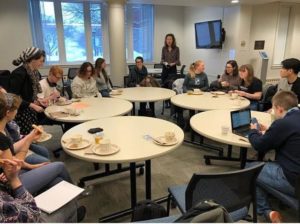Miriam Moore-Keish ’19
First Thursday time came around again! On February 7, Humanities students gathered in the Harmon Room of the library to enjoy soup and to address a word that strikes fear in the hearts of all who hear it: networking. Should we really fear it, though? According to Susanna Drake, chair of the Religious Studies department, we absolutely should not. “You don’t even have to use the word ‘networking,’” she said.
Professor Drake invited two Macalester alumnae to share their networking tips and tricks: Julia Hobart ’15 and Jordan Whitman ’17. Hobart is currently working with the Minnesota Council of Churches and playing with her band while Whitman is working in a café and organizing queer Jewish collectives in the Twin Cities. All three touched on some anxieties and questions posed by the Macalester students present.
First things first: What even is networking? Hobart defined it as “just meeting people.” She continued, “It’s when you take someone outside of your network and put them in your network. Reach out to people you admire. It’s like going to a concert and you go up [to the band] afterward and say ‘I like your music,’ and they say, ‘Have you heard this album?’ It snowballs.”
So what does networking look like? I know I have an image in my head of stuffy, important CEOs and starving young professionals thrown into a room together, expected to fight to the death for employment. Hobart made the important point that networking is often unintentional. “You find yourself in spaces you care about with similar-minded people,” she said, “I don’t often network intentionally, but I don’t think it’s random.” Now what if we do find ourselves in intentional networking spaces? Apps & Alums is coming up today, March 7, after all. There is somewhat of a formula according to Drake and Hobart:

- Approach someone and greet them. Whitman added that you can talk about the weather or any sort of small talk that forms a connection.
- Say what you know about them and what you admire. “It’s more natural to them than it feels to you,” Hobart encouraged, “just don’t put the burden on them to come up with what to say.”
- Introduce yourself. Drake encouraged students to say one sentence about their past, one about their present, and one about their future career goals or missions.
- Leave the conversation. It might feel uncomfortable to just leave a conversation but Hobart reminded students that at formal networking events, they don’t need an excuse to walk away. According to Whitman, if you are at a loss for an out, refreshments are always a good escape.
In this Internet age, many students have LinkedIn or Handshake profiles. “How much do you use LinkedIn or Handshake?” one student asked. Whitman and Hobart responded in unison, “Never.” (Sorry, CDC!) “In-person interactions are always more valuable,” Whitman said. Hobart added, “Most hires are based on person-to-person interactions and people testifying word-of-mouth that you’re passionate. Do what you’re passionate about and people will be drawn to you.”
Whether you network through technology or in person, Drake said to “be yourself and people will know who you are going to be.” Hobart echoed Drake, identifying the “misconception that you have to be a certain way to be worthy of attention.” She said, “you don’t have to reshape yourself to be part of someone’s network, you just have to bring them in.”
Now that we have some techniques and, hopefully, some more confidence about networking under our belts, how do we get started? How have we already gotten started? Getting advice is a form of networking, the alumnae reminded us. Relationships with professors and peers are already the results of networking. Drake encouraged students to use office hours. “[Professors] are here because we love helping students,” she said. “It’s not a burden. We are part of your network built in by virtue of you being Macalester students.” Drake reminded students of the resources available to them through the Career Development Center. “The CDC has a vast alumni database. Alumni are begging to help Mac students and Mac grads. It is available and will be for the rest of your lives,” she said, “Macalester is a network that is always there for you.”
First Thursdays take place on the first Thursday of every month in the Harmon Room. Join us for the next First Thursday at 4:45 on March 7: Interviewing 101.